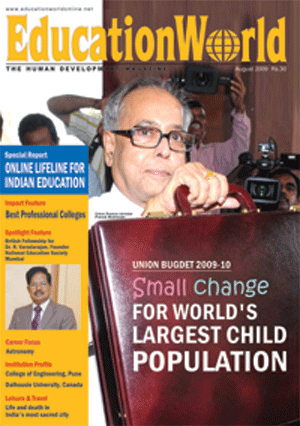Dashed hopes
 I wonder if there will ever be any positive news about education in India. I read your cover story ‘Small change for world’s largest child population’ (EW August) and, like the author, found my hopes dashed. The tight-fisted, short-sighted Pranab Mukherjee has thrown a pail of cold water on Kapil Sibal’s ambiti-ous plans for reforming Indian education.
I wonder if there will ever be any positive news about education in India. I read your cover story ‘Small change for world’s largest child population’ (EW August) and, like the author, found my hopes dashed. The tight-fisted, short-sighted Pranab Mukherjee has thrown a pail of cold water on Kapil Sibal’s ambiti-ous plans for reforming Indian education.
I wonder how the government plans to keep pace with China, when its next generation of workers is emerging from a malnourished and inefficient educa-tion system. With all his penny-pinching, the prudent Mukherjee has failed to take into account that long-term investment in education of generation next will reap higher dividends than cosmetic rural development initiatives. Now that the Lok Sabha has finally passed the Right to Education Bill, how does the government plan to pay for its implementation?
Surajkumar Shetty
Bangalore
Online mirage
If online education is the way of the future, I have serious doubts about the future of education in India (‘Online lifeline for Indian education’, EW August). Without any human contact whatsoever, how can we expect students to learn concepts and finish their coursework?
The revelation that over 75 percent of India’s engineering graduates and 80 percent of arts, science and commerce graduates are unemployable, is an indicator of the poor quality of education dispensed in our higher education institutions. How can a rural student with only a tenuous grasp of English, possibly learn his lessons online?
Nonetheless, for students in the hinterland, enroling in an online degree programme may be a case of choosing the lesser evil. I only hope that professors delivering online education are exceptionally talented to be able to nurture individual talent in classes that could have thousands of students.
Shruthi Sinha
Delhi
Glaring omission
I read educationworld regularly and want to congratulate you on the wonderful job you are doing. However there is a huge omission in your cover story ‘Education agenda for UPA-2’ (EW July).
Although the story begins well, I feel the shortcomings of education in our country could have been better highlighted, especially the lack of cohesion in teacher education between the NCTE and NCERT and in the case of special educators, the RCI (Rehabilitation Council of India).
Moreover one of the major omissions of your story is that you have not commented on 30 million disabled children excluded from the Right to Education Bill. As you know, we have been exerting pressure on the education minister, prime minister and Mrs. Sonia Gandhi to include children with disabilities within the ambit of the Bill. Though the minister gave an impassioned speech in Parliament, disabled children are still excluded. We are now taking legal advice about this glaring omission.
Mithu Alur
Mumbai
Sensational report
I was in Melbourne until early June and was horrified by the attacks on Indian students and the over-reaction of the press in Australia and India, which exacerbated the problem.
The special report (EW July) by David Wightman took the typical sensational approach, as indicated by the head-line: ‘Rampage Down Under’, and the lengthy ramble through Australia’s shameful ‘White Australia policy’ that ended in 1973, which has little or no bearing, on the current situation. I know many Indian families who are settled for decades in Melbourne, as well as several students who are studying there now, who have enjoyed the richness and warmth of multi-cultural, egalitarian Aussie society.
I have lived in India and Nepal since 1988 and have occasionally been on the receiving end of racist taunts and have had some scary moments travelling in the northern states, including being robbed once on an overnight train. But I have been careful to avoid situations where I might be vulnerable or at risk. On the whole I have felt safe and welcomed in India, the land of my birth. Yet I would equally avoid putting myself into risky situations in Australia, the land of my citizenship. The problem may have a racist tinge to it, but the greater reality is that there are opportunists everywhere who will take advantage of those who are vulnerable.
I was pleased that there was some balance and objectivity in the EW report and I applaud Summiya Yasmeen’s points and reference to Debanshu Dasgupta’s article in Outlook. What is more distressing than the few who have been attacked, are the many thousands of international students who have been lured to Australia through mislead-ing advertising and false pretences, and have been fleeced by dubious RTOs (registered training organisations). That is something that EW should rightly investigate and protest.
John Barclay on e-mail
Changed mindsets needed
Your cover story ‘Education agenda for UPA-2’ (EW July) clearly shows that there is urgent need for thorough and balanced reform of the education system to make learning enjoyable for children. School authorities need to rethink their goals and objectives. The primary goal of every school should be holistic development of their students.
In this context, examination reform is of vital importance and an effort to introduce objective-type questions should be made. Rather than becoming too ambitious, educationists should try to make the education system simpler, enjoyable and transparent. Changed mindsets are the need of the hour.
Vinod C. Dixit
Ahmedabad